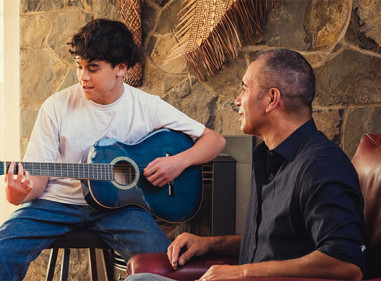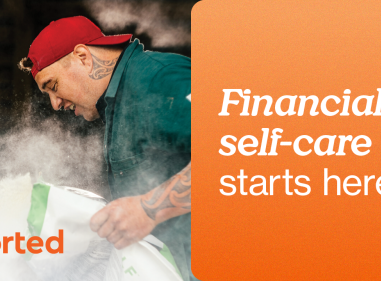
Planning & budgeting
Saving & investing
KiwiSaver
Tackling debt
Protecting wealth
Retirement
Home buying
Life events
Setting goals
Money tracking
Plan your spending with a budget
Getting advice
Studying
Get better with money
What pūtea beliefs do you have?
How to build up your emergency savings to cover unexpected costs
How to save your money
How to start investing
Find a financial adviser to help you invest
Your investment profile
Compound interest
Net worth
Types of investments
Term deposits
Bonds
Investment funds
Shares
Property investment
How KiwiSaver works and why it's worth joining
How to pick the right KiwiSaver fund
Make the most of KiwiSaver and grow your balance
How KiwiSaver can help you get into your first home
Applying for a KiwiSaver hardship withdrawal
How to use buy now pay later
What you really need to know before you use credit
How to get out of debt quickly
Credit reports
Know your rights
Pros and cons of debt consolidation
Credit cards
Car loans
Personal loans
Hire purchase
Student loans
Getting a fine
What happens if I start to struggle with moni?
How to protect yourself from fraud and being scammed
About insurance
Insurance types
Insuring ourselves
Wills
Enduring powers of attorney
Family trusts
Insuring our homes
Losing a partner
Redundancy
Serious diagnosis
How to cope with the aftermath of fraud
Separation
About NZ Super – how much is it?
When you’re thinking of living in a retirement village
How to plan, save and invest for retirement
Manage your money in retirement
Find housing options in retirement
Four approaches to spending in retirement
Planning & budgeting
Saving & investing
How to build up your emergency savings to cover unexpected costs
How to save your money
How to start investing
Find a financial adviser to help you invest
Your investment profile
Compound interest
Net worth
Types of investments
Term deposits
Bonds
Investment funds
Shares
Property investment
View all
KiwiSaver
Tackling debt
How to use buy now pay later
What you really need to know before you use credit
How to get out of debt quickly
Credit reports
Know your rights
Pros and cons of debt consolidation
Credit cards
Car loans
Personal loans
Hire purchase
Student loans
Getting a fine
What happens if I start to struggle with moni?
View all
Protecting wealth
Retirement
Home buying
Reading time: 5 minutes

Being onto it with money is really important. It will help you establish control over where you want to head in life, providing you with a sense of tino rangatiratanga. When you feel like you’re in control of your money, you can make smart decisions for yourself and for your whānau.
As we learn about and get better with pūtea, this knowledge will further enable us to manaaki our people.
What do wise pūtea decisions look like? There are a few tips and tricks we’ve put together that we think can really help when you are starting out on your pūtea journey.
There’s usually somebody in our whānau who just seems really switched on when it comes to all things pūtea. They always seem to know what to do when things get tricky financially, and if we think about their journey over time with pūtea, it seems like they make wise decisions.
Having a kōrero with them kanohi ki te kanohi is a really good place to start. Ask them:
Don’t be whakamā about this kōrero. We think you’ll find people are really willing to help their friends and whānau get ahead.
The more you talk about it, the less difficult it will seem. Learn more tips about having a kōrero about pūtea.

“When I get paid, I always put money away to work towards my goal. At the moment I want to save $3k. Then I split the rest up into things I need to buy and then things I might want from time to time. “Since I’ve started to get paid, I’ve tried to reach a goal. Each week I work out how much I need to put away to reach my goal by a certain date.”
Mareikura, 20
Have a think about how much money you have coming in each week. This is essentially what you earn. You need to get a good sense of where this money comes from, how much and how often, and then you need to think about all the things you spend it on each week.
We like to call this a mahere pūtea. See how you can make a plan.
Often we think about what we are going to do with any moni we have left over, but it’s more helpful to think about how moni can help us reach our goals.
Think about these goals in terms of something that we are keen to get now, or some of our longer-term dreams that might require a bit more pūtea in the future, like buying a house for whānau. If that’s something you dream of, here’s more about saving for a first home.
Sometimes it’s really helpful to think about separating your moni into buckets.
Think about putting a little bit of money into each of these buckets each week. Each bucket will be a slightly different size, to represent the amount of money it holds.
Your emergency bucket doesn’t need to be very deep, but always try and keep it full. Your bucket for spending now is probably the one that gets filled up and emptied a lot. But try not to buy the thing you want until the bucket is full.

“I save for the things I want. If I don’t have the money, I don’t buy it. Mereana, 22 ”
Mereana, 22
The biggest, deepest bucket is the one for the long term. It doesn’t need to fill up as quickly as the other two, but ideally as we put a little bit of money into it every week, we see it slowly filling up. Learn more about tips and tricks to help you fill your buckets or save pūtea.
But you may have a look at how much moni is coming in and out and learn there is more going out than coming in. If you rely on borrowing to get by, debt can become a bit of a trap if you don’t know how to get out of it. Learn more about the ins and outs of debt.
Guide
Everyone needs an emergency fund. When things go pear-shaped, we need to cover ourselves and those we’re closest to. That’s…

Guide
It’s important to take a little bit of time to think about our relationship with money and what we believe…

Guide
Budgets help us plan where our money should be going, but it’s also important to track where our money actually…
Guide
Here’s the first step to sorting our finances: working out where we want to be moneywise and what our priorities…

Guide
Studying can be an investment in our future. Interest-free student loans seem like easy money, but borrowing too much could…

Guide
Managing money can be challenging – not all of us have the skills to sort out the more complicated stuff.…

Guide
A budget (or money plan) is really just a simple plan for your spending.

Video
Get your saving sorted by tuning in to this free one-hour webinar hosted by financial adviser Unicia Veer.

Video
This free webinar about whānau financial wellbeing is designed with te ao Māori in mind.

Video
Tune in to a quality kōrero with a panel of financial professionals as they share emergency savings fund tips and…

Use verification code from your authenticator app. How to use authenticator apps.
Code is invalid. Please try again
Don't have an account? Sign up
Or log in with our social media platforms


A free account gives you your very own space where you can save your tools and track your progress as you get ahead.
Or sign up using Google:


